

Key Takeaways:
Search engines now fingerprint individual AI tools, making ChatGPT-generated content easier to detect than ever
Brand authority erosion happens gradually through a generic AI tone before owners notice decreased customer trust levels
Future algorithm updates will intensify AI detection, making current ChatGPT strategies increasingly risky for businesses
ChatGPT creates invisible damage to websites while owners celebrate efficiency gains. Site owners worldwide embrace this AI tool for quick content creation. They write blog posts and web pages in minutes instead of hours. The appeal is obvious, and results seem impressive initially.
Recent research reveals troubling patterns emerging across millions of websites. Nearly 19% of top search results now contain AI content, yet many sites experience mysterious traffic drops. Search engines evolved detection methods faster than people realize. The real cost of AI dependency extends beyond surface metrics.
Google launched its most aggressive AI content crackdown in March 2024. The search giant targeted websites relying heavily on unedited AI writing. Over 1,400 websites disappeared from search results overnight without warning.
The algorithm update focused on content quality markers that ChatGPT consistently fails to meet. Google evaluates expertise, experience, authority, and trustworthiness in every piece of content. AI writing lacks genuine human insights and real-world experience.
Data from affected websites tells a stark story. Sites using only AI content dropped an average of eight search positions. Their website traffic decreased by 17% within weeks. Meanwhile, businesses combining AI drafts with human expertise dropped only three positions and lost just 6% of traffic.
AI generates remarkably similar content when multiple users employ comparable prompts. Thousands of website owners request identical topics using basic instructions. The result is a flood of nearly duplicate articles across different domains.
Consider what happens when ten business owners ask ChatGPT to write about email marketing tips. The AI produces articles with similar structures, identical main points, and overlapping phrases. Each piece might have minor variations, but core content remains essentially the same.
The ChatGPT SEO impact becomes devastating when competitors unknowingly publish similar content. Instead of standing out in search results, websites blend into an indistinguishable mass of AI-generated material. Brands lose their unique voice and perspective.
AI content creates hidden technical problems that most website owners never discover. Search engines frequently crawl AI-generated pages but refuse to index them for search results. This ‘crawled but not indexed’ status has become increasingly common for sites heavily dependent on automated content.
Poor content quality sends negative signals to search engine algorithms. Google interprets low-quality AI writing as a sign that entire websites lack trustworthiness. This perception affects crawling frequency and indexing speed across domains.
AI training bots create additional complications by generating artificial traffic spikes. These bots crawl websites constantly to gather training data. Website analytics show increased visitor numbers, but these visits never convert to actual customers.
AI content content lacks the authentic voice that builds lasting brand trust. Readers instinctively recognize artificial sounding text and respond with decreased engagement. The generic tone fails to create emotional connections with audiences.
AI cannot share genuine experiences or provide insider industry knowledge. When ChatGPT attempts to discuss specialized topics, it often produces confident-sounding but inaccurate information. These errors directly damage brand reputation when published under company names.
Search engines now evaluate individual author authority as a ranking factor. They prefer content created by recognized experts with established credibility. AI tools cannot build this personal authority because it has no real identity or professional background.
Search engines will continue improving their AI detection capabilities throughout 2025 and beyond. Current detection methods represent just the beginning of more sophisticated content evaluation systems. Websites that depend entirely on unedited automated content face increasing risks.
The most successful approach combines AI efficiency with human expertise and creativity. Smart website owners use ChatGPT to generate initial drafts and research ideas. They then add original insights and expert analysis before publishing.
Regular performance monitoring becomes essential for detecting ChatGPT search rank drop patterns. Website owners should track ranking positions, organic traffic, and indexing status closely. Sudden decreases often indicate AI content penalties.
The evidence suggests that over-reliance on ChatGPT creates more problems than solutions for most websites. The impressive AI tools offer efficiency gains, but they cannot replace creativity and an authentic brand voice. A concerning trend emerges that most of the website owners remain unsuspecting of the negative impact suffered by the AI content until such damage becomes irreversible.
Search engines are getting better at identifying and punishing poor AI writing. Such a technological arms race will intensify, instead of diminishing over time. Winning websites will strike a hard balance between granting AI support and human value creation.
Also Read: Frase vs. Grammarly: Choosing the Best AI Writing Assistant for 2025
